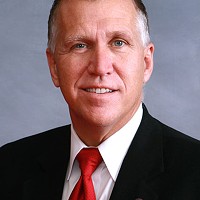Last month, a team of researchers released the results of a study on political influence, which basically concluded the United States is an oligarchy. Our country's laws and policies reflect the wishes of a small collection of elite interest groups, rather than the majority of citizens. Well, duh.
Legislation that solely affects the wealthy elite is routinely passed at the expense of the general population and right in front of our faces; the bank bailouts and the Monsanto Protection Act are two high-profile examples. Our courts have decided in their favor as well. The Supreme Court ruled in favor of the wealthy elite in Citizens United vs. FEC, which paved the way for corporations to fund candidates without any spending limits.
On the surface, North Carolina's campaign-finance regulations seem pretty reasonable. Political action committees and candidates are only able to accept $5,000 per giver, per election. Corporations and unions can't give directly to candidates or to political parties, and candidates must disclose all donors.
However, there have always been loopholes, as evidenced by last year's AP report showing $239,000 in laundered gambling money somehow made its way into the campaigns of Pat McCrory and Thom Tillis. In 2014, those loopholes are now wider and easier to spot than ever.
This is thanks to a controversial bill passed by the General Assembly last session. You know the one — dubbed by opponents "The Anti-Voting Act," it carried the new voter-ID law and abolished a week of early voting.
One example of a loophole in the bill is, although corporations are still prohibited from giving money to political parties or candidates, they are now allowed to donate to "building funds," which can be used for party headquarters, staff salaries, travel or fundraising expenses — or about 80 percent of campaign overhead. Another is that special interest groups have to disclose when they create campaign-style ads, but only ones that air after Sept. 17 of the election year, making the entire summer a spending free-for-all of secrecy.
Given these and other convoluted work-arounds designed to give the appearance of regulation, getting elected is damn near impossible for grassroots candidate representing the actual people of our state.
"The flow of money is determined by the chosen agenda of the national party which has, unfortunately, nothing to do with what is good for us as individuals," says Kirk Sherrill, a Republican candidate vying for a seat on the General Assembly.
Though he is running as a Republican, the GOP isn't financially supporting Sherrill, opting instead to support his opponents in this month's primary. That's likely due to Sherrill advocating for legalizing medical marijuana, a stance that doesn't jibe with standard Republican ideology.
Another local candidate who knows the struggle of being a grassroots candidate opposing major party darlings is David Hendrix, who is also vying for a seat on the General Assembly. "It is becoming increasingly difficult to win based on personality and platform," says Robert John Kellogg, campaign manager for Hendrix. "It is sad but true: Most candidates who win races on a county, state or national level do so with a great amount of financial support. Sadder yet is the realization that the winning candidate may not be the best for the job, just a better fundraiser."
For Sherrill and Hendrix, even making their way onto the November ballot will be a significant victory. Because Sherrill isn't the pick of his party, the odds that he'll advance past primaries are stacked against him. And North Carolina has the most restrictive ballot access requirements in the entire nation, making the battle for independents like Hendrix that much harder to win.
North Carolina requires the highest number of signatures of any state in the union for new political parties to be listed on the ballot (about 89,366 or 2 percent of votes cast in the last gubernatorial election), and for unaffiliated candidates it can be even worse: 4 percent if running for local office, 2 percent for national office, with at least 200 signatures from each congressional district. This requires potential candidates to pay professional signature gatherers, which consumes a great deal of funds before he or she even enters the race.
In a study of ballot regulations and their effect on multi-party politics, University of Wisconsin-Madison political science professor Barry C. Burden said "a requirement as high as 2 percent of the electorate would effectively eliminate all competition aside from the Democrats and Republicans." That certainly seems to be what they're going for in Raleigh.
Still, there are grassroots candidates out there, like Sherrill and Hendrix, running on sheer determination and faith in their values.
"But I eagerly look forward to the day that both parties work together to end the corporate takeover of our electoral process," Kellogg says.
